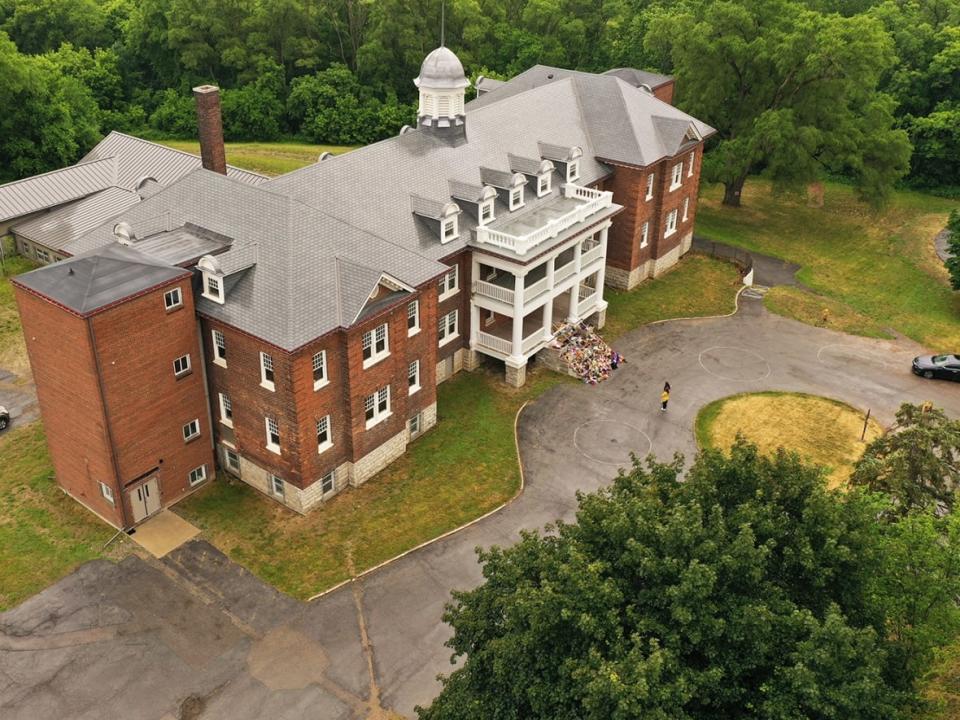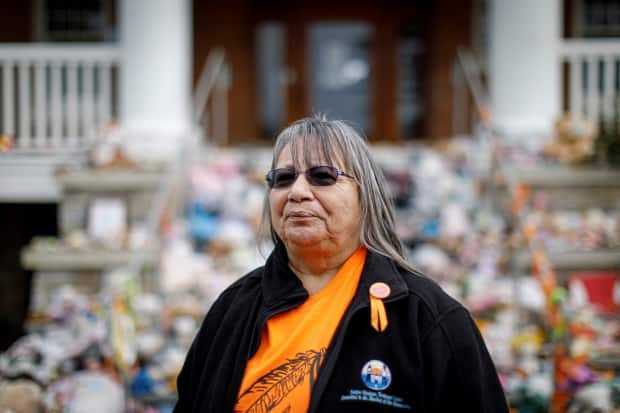Survivors of Mohawk Institute Residential School in Ontario get $10.2M from Ottawa to look for unmarked graves

WARNING: This story contains distressing details.
The group overseeing the search for unmarked graves at the former Mohawk Institute Residential School in Brantford, Ont., is getting over $10 million from Ottawa, but says it isn't enough to help them do their work.
The federal funding to the Survivors' Secretariat at Six Nations of the Grand River will be disbursed over three years as the search is underway.
"We're obviously very pleased about the support that Canada has provided us," Kimberly Murray, executive lead for the secretariat, told CBC Hamilton on Monday.
"It's not going to be enough, and in fact, the budget we put forward was for more, but it's definitely helped us with the start of our search and the search for records as well."
The search began in November after Tk'emlúps te Secwépemc First Nation's preliminary search in Kamloops, B.C., last May detected 215 potential graves.
Mark Hill, elected chief of Six Nations, said in a joint-statement with the government that the funding is "an important step in the journey to bring our lost children home."
Marc Miller, minister of Crown-Indigenous relations, said people "deserve to find out the truth" and the government is "committed to supporting those efforts as they work toward healing and closure."
WATCH | Search begins in Brantford, Ont., at former residential school
Murray said the initial funding request was for over $8 million per year for three years.
"The search is quite expensive, the technology is expensive, the analysis of the data is expensive."
The survivors also want to create community archives for documents about the history of the school and the people who suffered in it.
The former Mohawk Institute opened in 1828 and closed in 1970, making it one of the oldest and longest-running residential schools in Canada.
Some 15,000 students from 20 First Nation communities were at the school. Many of them were abducted from their homes and abused there.
Records indicate there were 54 deaths at the residential school, but local police services said they didn't know where they were buried.
Call for Ontario to offer more funding
The province, Murray said, hasn't been helpful with search efforts.
Hill wrote a letter in late October asking for $3 million per year for three years.
At the time, the province would only commit $400,000 over three years, which Murray called "laughable."
"This amount of funding falls short and is not commensurate with Ontario's role in the operation of the school. It is also contrary to the 'meaningful reconciliation' that you committed to," read Hill's letter.
Now, Ontario is willing to offer $700,000 over three years, Murray said.
According to Murray, that money still isn't enough and the province is giving all communities undergoing searches at former residential school sites the same amount.
"That's not an equitable allotment. We're in the midst of the search, we have the oldest school, the longest-running and 600 acres [243 hectares] ... but you're going to give us all the same amount of money and not provide the funding based on the need of the funding."
CBC Hamilton contacted Ontario's Ministry of Indigenous Affairs for comment, but hadn't received a response at the time of publication.
In the meantime, Murray said, the secretariat is fundraising.
Almost 4 hectares searched so far
The secretariat is led by residential school survivors, and search efforts include Ontario Provincial Police, Six Nations and Brantford police services. The team will soon bring on staff and researchers.
Murray said the team has searched almost four hectares so far, focusing on the area around the former residential school building.
Now, the secretariat is planning for the search in the spring. The heavy snow has thwarted efforts for now.
The team is trying to be as thorough as possible, Murray said.

It is using ground penetrating radar (GPR) equipment, which look like yellow and black lawn mowers, to scan the area for "anomalies" that are analyzed to determine if they are potential unmarked graves.
The search team also did a $50,000 pilot project with light detection and ranging technology (LiDAR), where laser light is shined into the ground and bounces back up to detect what's beneath the surface.
"If you did LiDAR on the entire grounds, it would cost over $2.5 million," Murray said.
The ground-penetrating radar data will be analyzed and compared to the LiDAR results.
"We're not going to dig just to dig. We want to know exactly where we need to put our attention," Murray said.
Some of those pushing the GPR carts in a grid pattern survived the residential school — some of their friends disappeared and it's unknown if any of them may be buried on those grounds.
"The truth of our experiences must be told, and this highlights the importance of why this work must be survivor led," 65-year-old Sherlene Bomberry, who survived more than two years there, said in a statement.
Support is available for anyone affected by their experience at residential schools and those who are triggered by these reports.
A national Indian Residential School Crisis Line has been set up to provide support for residential school survivors and others affected. People can access emotional and crisis referral services by calling the 24-hour national crisis line: 1-866-925-4419.

